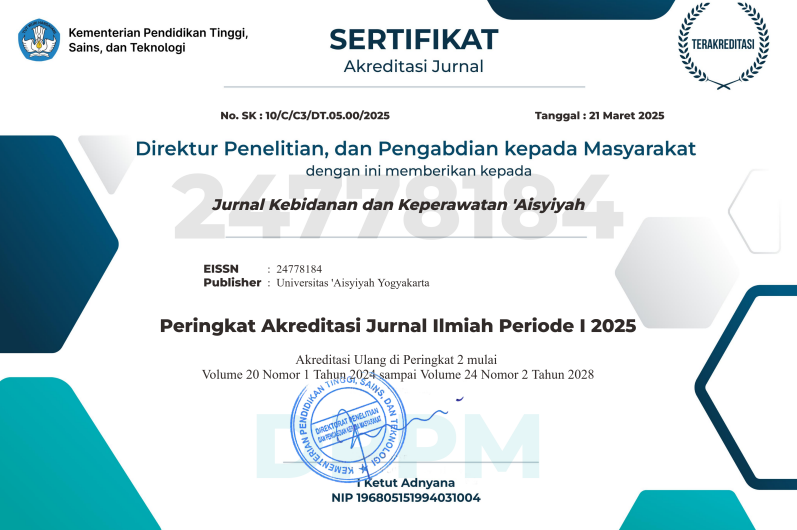Kecemasan sebagai Penyebab Gangguan Kesehatan Mental pada Kehamilan di Layanan Kesehatan Primer Kota Surakarta
DOI:
https://doi.org/10.31101/jkk.2064Abstract views 2093 times
Keywords:
gangguan, kehamilan, kesehatan mental, kecemasan.Abstract
Downloads
References
Annerangi, W., & Helda, H. (2013). Prevalensi dan Determinan Ansietas dan Depresi Antenatal di Puskesmas Kecamatan Pasar Minggu tahun 2013 (Universitas Indonesia). Repository:Thesis, Universitas Indonesia. Retrieved from http://www.lib.ui.ac.id/naskahringkas/2015-09/S53325-wiyar annerangi
Basri, A. H., Zulkifli, A., & Abdullah, M. T. (2014). Efektivitas Psikoedukasi terhadap Depresi Postpartum di RSIA Sitii Fatimah dan RSIA Pertiwi Makassar Tahun 2014. Repository: Thesis, Universitas Hasanudin, Makasar.
Biaggi, A., Conroy, S., Pawlby, S., & Pariante, C. M. (2016). Identifying the women at risk of antenatal anxiety and depression: A systematic review. Journal of Affective Disorders, 191, 62–77. https://doi.org/10.1016/j.jad.2015.11.014
Chowdhary, N., Sikander, S., Atif, N., Singh, N., Ahmad, I., Fuhr, D. C., … Patel, V. (2014). The content and delivery of psychological interventions for perinatal depression by non-specialist health workers in low and middle income countries: A systematic review. Best Practice and Research: Clinical Obstetrics and Gynaecology, 28(1), 113–133. https://doi.org/10.1016/j.bpobgyn.2013.08.013
Clarke, K., King, M., Prost, A., & Tomlinson, M. (2013). Psychosocial Interventions for Perinatal Common Mental Disorders Delivered by Providers Who Are Not Mental Health Specialists in Low-and Middle-Income Countries: A Systematic Review and Meta-Analysis. PLoS Medicine, 10(10), e1001541, 1-17. https://doi.org/10.1371/journal.pmed.1001541
Elsenbruch, S., Benson, S., Rucke, M., Rose, M., Dudenhausen, J., Pincus-Knackstedt, M. K., … Arck, P. C. (2007). Social support during pregnancy: Effects on maternal depressive symptoms, smoking and pregnancy outcome. Human Reproduction, 22(3), 869–877. https://doi.org/10.1093/humrep/del432
Gelaye, B., Rondon, M., Araya, R., Williams, M. A., & Author, C. (2016). Epidemiology of maternal depression, risk factors, and child outcomes in low-income and middle-income countries HHS Public Access. Lancet Psychiatry, 3(10), 973–982. https://doi.org/10.1016/S2215-0366(16)30284-X
Goodman, J. H., Chenausky, K. L., & Freeman, M. P. (2014). Anxiety disorders during pregnancy: a systematic review. The Journal of Clinical Psychiatry, 75(10), 292-33. https://doi.org/10.4088/JCP.14r09035
Howard, L. M., Molyneaux, E., Dennis, C. L., Rochat, T., Stein, A., & Milgrom, J. (2014). Non-psychotic mental disorders in the perinatal period. The Lancet, Vol. 384( 9956). 1775-1788. https://doi.org/10.1016/S0140-6736(14)61276-9
Ibanez, G., Bernard, J. Y., Rondet, C., Peyre, H., Forhan, A., Kaminski, M., & Saurel-Cubizolles, M. J. (2015). Effects of antenatal maternal depression and anxiety on children’s early cognitive development: A prospective Cohort study. PLoS ONE, 10(8). https://doi.org/10.1371/journal.pone.0135849
IMPAC. (2017). Provision of Effective antenatal care. In Standart for MAternal and Neonatal Care developed by The Departement of Making Pregnancy Safer, WHO. Retrieved from http://www.who.int/reproductivehealth/publications/maternal_perinatal_health/effective_antenatal_care.pdf
Jarrett, P. (2015). Student midwives’ knowledge of perinatal mental health. British Journal of Midwifery, 23(1), 32–39. https://doi.org/10.12968/bjom.2015.23.1.32
Lancaster, C. A., Gold, K. J., Flynn, H. A., Yoo, H., Marcus, S. M., & Davis, M. M. (2010). Risk factors for depressive symptoms during pregnancy: a systematic review. American Journal of Obstetrics and Gynecology, 202(1), 5–14. https://doi.org/10.1016/j.ajog.2009.09.007
Leigh, B., & Milgrom, J. (2008). Risk factors for antenatal depression, postnatal depression and parenting stress. BMC Psychiatry, 8(8), 1–11. https://doi.org/10.1186/1471-244X-8-24
Loughnan, S. A., Wallace, M., Joubert, A. E., Haskelberg, H., Andrews, G., & Newby, J. M. (2018). A systematic review of psychological treatments for clinical anxiety during the perinatal period. Archives of Women’s Mental Health, 1–10. https://doi.org/10.1007/s00737-018-0812-7
Mahayati, A. (2015). Pengaruh psikoedukasi terhadap pencegahan terjadinya depresi postpartum di Rumah Sakit Panti Rapih Yogyakarta. Repository: Thesis Universitas Gadjah Mada Yogyakarta.
Marcus, M., Yasami, M., Ommeren, V., Chisholm, D., & Saxena, S. (2012). Depression, a global public health concern. WHO Department of Mental Health and Substance Abuse, (Mental Health), 1–8. Retrieved from http://www.who.int/mental_health/management/depression/who_paper_depression_wfmh_2012.pdf
Maryam, S. (2015). Promosi Kesehatan dalam Pelayanan Kebidanan (Pertama; W. Praptiani & E. Tiar, Eds.). Jakarta: EGC.
Misri, S., Abizadeh, J., Sanders, S., & Swift, E. (2015). Perinatal Generalized Anxiety Disorder: Assessment and Treatment. Journal of Women’s Health, 24(9). https://doi.org/10.1089/jwh.2014.5150
Nice. (2007). CG45 Antenatal and postnatal mental health: NICE guideline; (February 2). Retrieved from www.nice.org.uk
Nillni, Y. I., Mehralizade, A., Mayer, L., & Milanovic, S. (2018). Treatment of depression, anxiety, and trauma-related disorders during the perinatal period: A systematic review. Clinical Psychology Review, 66. https://doi.org/10.1016/j.cpr.2018.06.004
Notoadmodjo, S. (2012). Promosi Kesehatan dan Ilmu Perilaku (Tiga). Jakarta: Rineka Cipta.
Patton, M. (2002). Qualitative Research and Evaluation Methods (3 th). United State of America: Sage Publications.
Rubertsson, C., Hellström, J., Cross, M., & Sydsjö, G. (2014). Anxiety in early pregnancy: Prevalence and contributing factors. Archives of Women’s Mental Health, 17(3). https://doi.org/10.1007/s00737-013-0409-0
Saeed, A., Raana, T., Saeed, A. M., & Humayun, A. (2016). Effect of antenatal depression on maternal dietary intake and neonatal outcome: A prospective cohort. Nutrition Journal, 15(1), 1–9. https://doi.org/10.1186/s12937-016-0184-7
Serçekuş, P., & Mete, S. (2010). Effects of antenatal education on maternal prenatal and postpartum adaptation. Journal of Advanced Nursing, 66(5), 999–1010. https://doi.org/10.1111/j.1365-2648.2009.05253.x
Stein, A., Pearson, R. M., Goodman, S. H., Rapa, E., Rahman, A., McCallum, M., … Pariante, C. M. (2014).Effects of perinatal mental disorders on the fetus and child. , 384 The Lancet § (2014).
WHO. (2015). WHO | Maternal mental health. Retrieved March 11, 2018, from WHO website: http://www.who.int/mental_health/maternal-child/maternal_mental_health/en/#.WqS3llHX-oo.mendeley
WHO. (2017). Depression and other common mental disorders Global: health estimates. World Health Organization, 1–24. https://doi.org/CC BY-NC-SA 3.0 IGO
WHO, D. of R. H. and R. (2016). WHO recommendations on antenatal care for a positive pregnancy experience WHO Library Cataloguing-in-Publication Data WHO recommendations on antenatal care for a positive pregnancy experience. I.World Health Organization. from World Health Organization. Retrieved from http://www.who.int
WHO, & World Health Organisation. (2008). Maternal mental health and child health and development in low and middle income countries. World Health, (February), 1–34. Retrieved from http://www.who.int/mental_health/prevention/suicide/mmh_jan08_meeting_report.pdf?ua=1
WHO. (2018). World Health Organization | Maternal health. Retrieved from Mental Health and Substance Use website: https://www.who.int/teams/mental-health-and-substance-use/maternal-mental-health
Downloads
Published
How to Cite
Issue
Section
License
With the receipt of the article by the Jurnal Kebidanan dan Keperawatan Aisyiyah Editorial Board and the decision to be published, then the copyright regarding the article will be diverted to Jurnal Kebidanan dan Keperawatan Aisyiyah. Universitas 'Aisyiyah Yogyakarta as the publisher of Jurnal Kebidanan dan Keperawatan Aisyiyah hold the copyright regarding all the published articles in this journal.
Jurnal Kebidanan dan Keperawatan Aisyiyah is licensed under a Creative Commons Attribution-ShareAlike 4.0 International License.
















